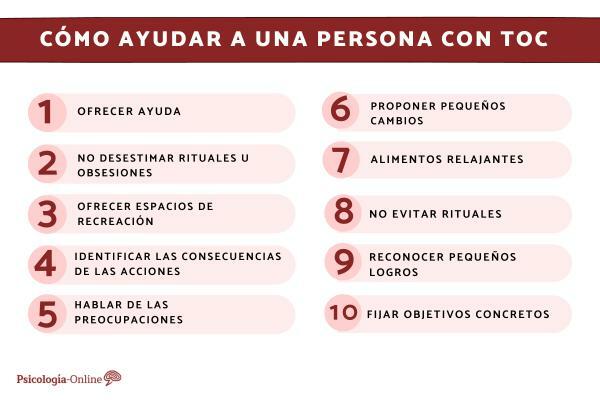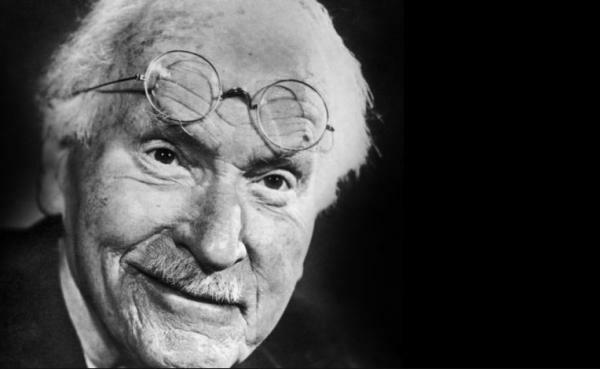
Each person we come across throughout our lives has specific personality characteristics, since no two people are the same. However, when someone has highly specific routines and repetitive thoughts that they can't shake, it often catches our attention. If we try to change something in everything they do, uncontrollable anguish is generated that does not stop, which obviously can cause them great discomfort. Although we make repeated attempts to modify schemes, everything remains invariable and rigid. These are some of the situations experienced by people with obsessive-compulsive disorder, a clinical picture that raises complex problems.
In this Psychology-Online article we will provide you with information about how to help a person with OCD.
Index
- Offer help
- Do not dismiss rituals or obsessions
- Offer recreational spaces
- Identify the consequences of actions
- talk about worries
- Propose small changes
- relaxing foods
- Do not avoid rituals
- recognize small achievements
- Set concrete goals
Offer help.
First of all, we must take into account that the behaviors of obsessive-compulsive disorder are not are voluntary and the person does not have a conscious intention to carry out rituals and/or habits specific. Thus, it is important to offer help so that people who suffer from this pathology feel understood and build tools that provide them with well-being.
Among the most viable options we highlight psychological and pharmacological therapy.

Do not dismiss rituals or obsessions.
Each ritual and obsession that manifests itself in OCD has specific reasons. Beyond the fact that some thoughts could have a crazy logic, these should not be dismissed, since if the rituals and obsessions of the painting are downplayed, the person might feel hurt and misunderstood.
It should be noted that empathy is necessary to help people who suffer. In this article we explain in depth What is empathy in psychology.
Offer recreational spaces.
Many people with serious compulsions and obsessions tend to spend their lives with them. Consequently, this produces that they do not have their own recreation spaces that distract them from those discomforts that they feel on a daily basis.
Given this, provide moments of leisure that generate momentary relief can be of great help.
Identify the consequences of actions.
OCD has the particularity of being a clinical condition that can bring some physical and psychological damage from its rituals and obsessions. In some cases, people are unaware of the results that could occur because they follow rigid behavior patterns.
For this reason, identify the consequences of actions It is essential for the person to be able to record what they do.
Talk about worries.
A person affected by severe OCD may believe that they are to blame for an unlimited number of harmful situations in everyday life. At a general level, there is usually a belief that a member of the family could suffer if the rituals are not performed as agreed.
Although they may be inflexible modalities, the fact that talk about these concerns with someone It will be of great help, since it allows you to reflect and draw interesting conclusions.

Propose small changes.
Patients diagnosed with OCD have serious difficulties to carry out new actions, since that would imply leaving aside some pre-established habits.
However, propose small changes in daily life Envisioning pleasurable activities can be a reassuring idea because it is something different that could happen.
Relaxing foods.
Food is highly related to the functioning of the Central Nervous System. In the same vein, we might think that people with OCD live in a state of constant nervousness because they need to have the full security of performing rituals and obsessions to continue forward.
However, the tension that this generates can be controlled eating relaxing foods such as green vegetables, nuts, dark chocolate, dairy products, among others. Also, some infusions can act in the body to produce relaxation.

Do not avoid rituals.
On many occasions, there is a tendency to interrupt rituals that a person performs to help them. However, this backfires as the OCD patient often becomes even more upset. Each action has a specific reason and should not be dismissed.
Rituals provide a structure that provides an identity to the person. Therefore, it is preferable to wait until it is possible to introduce some variation in the actions.
Recognize small achievements.
Highlight the behaviors that produce well-being It is extremely important for the person who has OCD since it generates well-being and tranquility for life. No matter how small the achievement may be for someone outside, it can represent a notable advance for the person.
For this very reason, it is worth recognize these modifications, since the perception varies according to the point of view that is adopted.

Set specific goals.
This clinical picture is highlighted by the need to have organized sequences and controlled activities in which there is nothing left to chance, so unpredictability is not an ally of people with OCD. Taking this into account, it is recommended set specific objectives that adapt to the particular needs of those who are suffering.
This conception will allow the person to express themselves in each situation and contemplate their tastes. If you want to know more about this clinical picture, in the following article you will find more information about How to overcome OCD.
This article is merely informative, at Psychology-Online we do not have the power to make a diagnosis or recommend a treatment. We invite you to go to a psychologist to treat your particular case.
If you want to read more articles similar to How to help a person with OCD, we recommend that you enter our category of Clinical psychology.
Bibliography
- De la Cruz Villalobos, N. (2018). Obsessive Compulsive Disorder. Synergy Medical Journal, 3 (11), 14-18.
- Sanz Vellosillo, P., Fernández-Cuevas Vicario, A. (2015). Obsessive Compulsive Disorder. Medicine Magazine, 11 (84), 5008-5014.


